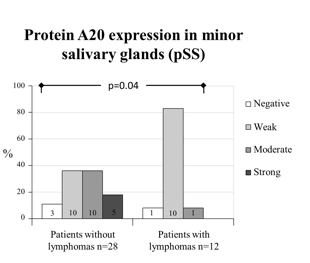Session Information
Session Type: Late-Breaking Abstracts
Background/Purpose: Patients with primary Sjogrens syndrome (pSS) have an increased risk of developing lymphomas, especially of the subtype mucosa-associated lymphoid tissue (MALT) lymphoma. Chronic antigen stimulation and increased activation of nuclear factor-κB (NF-κB) are considered important pathogenetic factors. In addition, formation of germinal center (GC)-like structures in minor salivary glands (MSG) has been suggested to be predictors for later lymphoma development.
Protein A20 is a tumor-suppressor and inhibitor of NF-κB, and is coded by the gene TNFAIP3. This gene has been associated with multiple autoimmune diseases, and functional defects have been detected in 20% of MALT lymphomas. In a recent study TNFAIP3 was associated with both pSS and with lymphomas in pSS. In the same study, exon-sequencing analysis of TNFAIP3 demonstrated potential functional abnormalities in 77% of pSS-associated MALT lymphomas. This indicates that loss of protein A20 could be a mechanism for lymphoma development in pSS. The aim of the present study was to investigate protein A20 expression in MSG, and assess whether protein A20 expression was associated with lymphomas in pSS.
Methods: In a nationwide search, we identified 21 patients with pSS classified according to the American-European Consensus Group criteria, and with a concomitant lymphoma. Tissue blocks from the MSG (n=12) and lymphomas (n=20) were analyzed and compared with MSG sections from pSS patients (n=28) without lymphomas, matched for age and gender at the debut of pSS disease. A20 staining in MSG lymphocytes was assessed by a pathologist blinded for clinical information about the patients, and scored as negative, weak, moderate or strong; in pSS patients with (n=12) and without lymphomas (n=28). A20 expression in pSS-associated lymphoma tissue sections (n=20) was also investigated.
Formation of GC-like structures in the MSG was evaluated blindly by two of the authors. Potential associations between protein A20 staining focus scores and GC-like structures were analyzed.
Results: PSS patients with lymphomas had weaker protein A20 expression in the MSGs than pSS patients without lymphomas (p=0.04). None of the patients with lymphoma had strong A20 expression in the MSG. Weak protein A20 expression was also highly associated with lack of GC formation (p=0.004) in MSG.
Weak or negative A20 expression was also observed in the majority of pSS-associated MALT lymphoma tissue sections (54%) and in lymphomas located in the MSG (54%).
Conclusion: Weaker protein A20 expression in MSG from pSS patients with lymphomas compared to pSS patients without lymphomas indicates that down-regulation of protein A20 could represent a mechanism involved in the lymphoma-genesis of patients with pSS. Finally, weak A20 expression in MSG was associated with absence of GC-like structures.
Disclosure:
S. J. A. Johnsen,
None;
E. Gudlaugsson,
None;
I. Skaland,
None;
E. Janssen,
None;
M. V. Jonsson,
None;
L. Helgeland,
None;
E. Berget,
None;
R. Jonsson,
None;
R. Omdal,
Elli Lilly,
5.
« Back to 2014 ACR/ARHP Annual Meeting
ACR Meeting Abstracts - https://acrabstracts.org/abstract/low-protein-a20-expression-in-minor-salivary-glands-is-associated-with-lymphoma-development-in-primary-sjogrens-syndrome/

